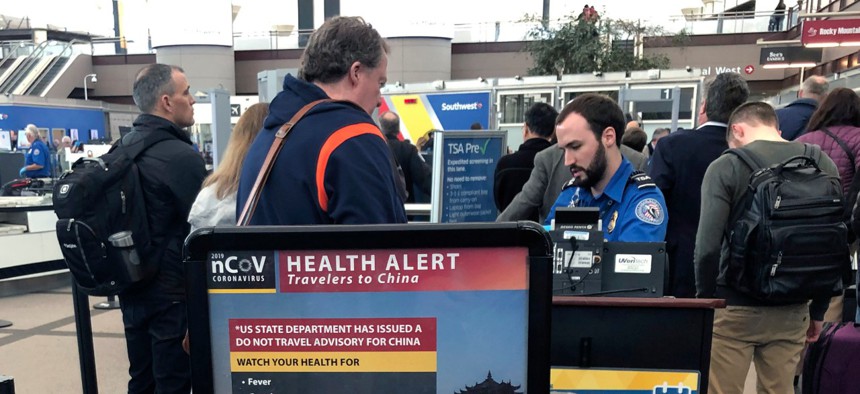TSA’s Decision This Year to End Payments for Janitorial Services at Checkpoints Has Some Worried
Airports are being forced to do more with less as cleaning efforts ramp up to prevent coronavirus spread.
Some air travel officials are expressing concern about a Trump administration decision earlier this year to eliminate federal funding for cleaning services at airport security checkpoints, fearing the decision to force airports with limited budgets to stretch their resources could exacerbate spread of the novel coronavirus.
The Transportation Security Administration has reimbursed airports for janitorial contracts or staffing costs at security checkpoints since the agency was created after the September 11th attacks. It proposed eliminating that funding in its fiscal 2020 budget to save $21 million. After Congress did not proactively include the funding in its annual appropriations bills, TSA moved forward with the cuts starting in January. While the proposal to eliminate the cleaning services reimbursement predated the coronavirus outbreak and was issued in conjunction with other efforts to shift TSA costs on to airports—such as defederalizing the staffing at exit lanes—its implementation is coinciding with it and a government directive for airports to dramatically ramp up sterilization efforts.
The airports themselves have complained to Capitol Hill and elsewhere that they cannot absorb the added costs, according to one air travel official. Airport officials say they do not have control of the security checkpoint areas and they should not have responsibility for cleaning them.
“The airports don’t—particularly smaller and medium-sized airports—they don’t have petty cash for this, even before the precipitous drop in passengers,” the air travel official said.
One TSA senior executive said the agency should reverse course during the current crisis, saying it raises concerns about cleanliness when all public health officials are stressing the need for constant sterilization. Frontline employees are concerned about coming to work, the executive said, and airports are struggling to take on the added responsibility. Without the funding, the executive explained, airports will hire fewer janitorial staffers or issue fewer contracts.
“Now they have to conduct even more cleaning,” the senior executive said. “This is the perfect storm. When the people actually needed that funding is right now.”
The executive called the decision to follow through on the cuts during the current crisis “ridiculous.”
“They’re having to do more with less, and it’s aggravated by a factor of 10,” the executive said.
Not all airports take the TSA funding, which the agency noted in its budget justification for the decision.
There is no statutory language “that expressly interprets any requirement as mandating reimbursement for general maintenance of the space provided to TSA, including janitorial services,” the agency said. “This proposal will enable TSA to focus its resources on higher priority security items.”
It added there would be no impact on performance of janitorial duties.
The air travel official stressed that airports have stepped up their cleaning overall, and most that have lost funding are simply addressing the immediate concern and worrying about how to pay for it later. TSA screeners themselves clean bins and other objects that passengers most frequently come in contact with.
The screeners have previously complained the agency has not provided them with proper equipment to protect themselves and passengers. Several TSA employees have tested positive for COVID-19, with dozens more home on quarantine due to potential contact. Agency management has demonstrated a lack of appreciation for the severity of the circumstances, they have said.
TSA did not respond to a request for comment in time for publication.




